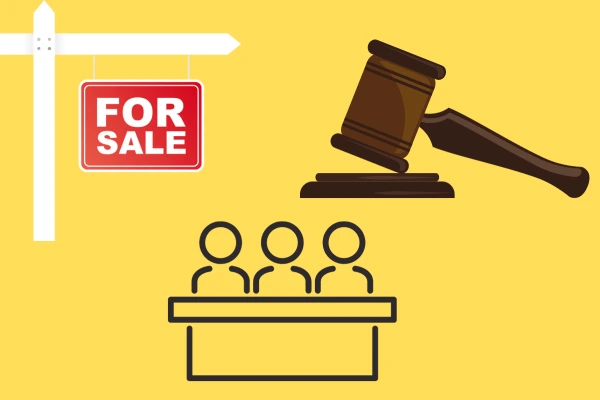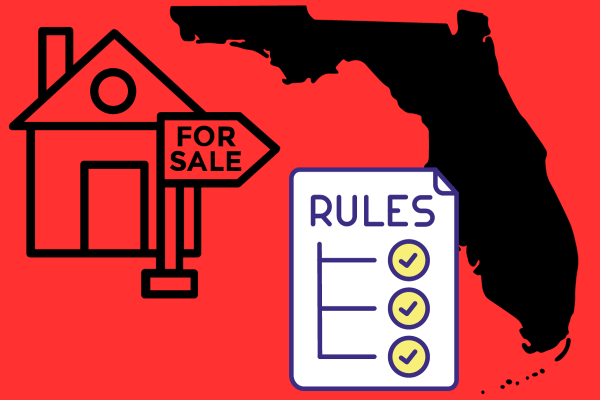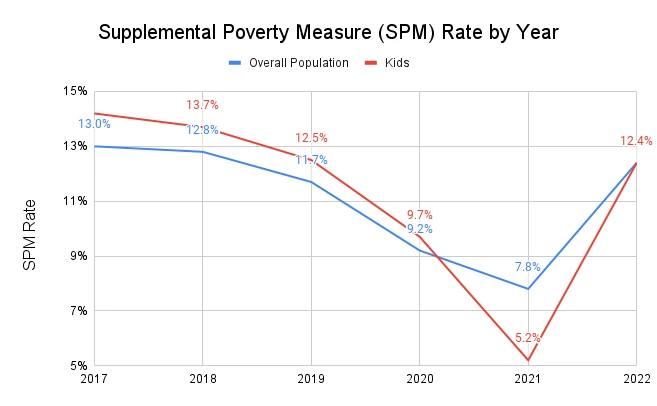Accretion. Accretion is the gradual build up of land due to the deposit of sand or soil from a body of water that borders a person’s property. Accretion increases the amount of property someone owns. The sand and soil that build up are referred to as alluvion. The opposite of accretion is erosion. A related concept is reliction which is an increase in land area due to the gradual receding of a body of water such as a lake.
ADA = Americans with Disabilities Act of 1990.
Alluvion = the sand, soil, and/or other material that builds up during the process of accretion.
BPO = Broker’s Price Opinion. BPOs are not appraisals and are exempt from USPAP guidelines. BPOs are sometimes requested by relocation companies and lenders involved in short sales of distressed properties. A minimum of 3 properties are usually used for comparison, and these properties are usually within a mile radius of the property being valued.
BRDA = Brokerage Relationship Disclosure Act. This is a Florida law contained within F.S. chapter 745, sections 475.2701-475.2801. The BRDA disclosure requirements only apply to residential transactions. They do not apply to the rental or leasing of real property, unless an option to purchase residential real estate is involved.
Bundle of Rights. Property rights consist of a basic “bundle of rights” that include:
- Possession — The owner’s right to possess or occupy the property.
- Enjoyment — The owner’s right to enjoy his property without interference.
- Disposition — The owner’s right to dispose of the property (i.e. to sell it or give it away).
- Control — The owner’s right to decide how the property will be used, provided the use does not conflict with any laws (such as zoning laws) or community association rules.
- Exclusion — An owner may put a “No Trespassing” sign or gate on the property which legally excludes others from entering.
CAM = Community Association Manager.
Caveat emptor = “buyer beware”. In a legal system that follows the principle of caveat emptor, the buyer alone is responsible for checking the quality and suitability of goods before a purchase is made. This is NOT how the current legal system in Florida works for real estate.
CC&Rs = Covenants, Conditions, and Restrictions. These are rules imposed by a community association such as an HOA, condo association, or neighborhood. They regulate the use, appearance, and maintenance of property.
CMA = Comparative Market Analysis. CMAs are not appraisals and are exempt from USPAP guidelines. A minimum of 3 properties are usually used for comparison, and these properties are usually within a mile radius of the property being valued. To produce a CMA, real estate licensees typically look at similar properties in the same area that are currently for sale, pending sales, or properties sold in the last 90 days. A CMA is often used to determine a listing price for a property.
Civil Rights Act of 1866 = The legislation which declared that all persons born in the U.S. were now citizens, without regard to race, color, or previous condition (meaning slavery). All citizens had the right to make and enforce contracts, sue and be sued, give evidence in court, and inherit, purchase, lease, sell, hold, and convey real and personal property.
Civil Rights Act of 1964 = Legislation passed by Congress which (1) outlawed discrimination based on race, color, religion, sex, or national origin, (2) prohibited unequal application of voter registration requirements, and (3) prohibited racial segregation in schools, employment, and public accommodations. In 2020, the Supreme Court decided it was also illegal to discriminate in employment based on sexual orientation and gender identity.
Initially, the Civil Rights Act of 1964 only granted weak enforcement powers. However, those enforcement powers were supplemented in later years.
Civil Rights Act of 1968 (a.k.a. The Fair Housing Act, or FHA). This is arguably the most important piece of legislation in all of real estate. The Act:
- Prohibits discrimination in sales, leasing, advertising sales or rentals, financing, or brokerage services,
- Prohibits discrimination based on race, color, religion, sex (added in 1974), national origin, handicap, or familial status (but not based on the marital status of couples, young age, occupation, or non service animal pets)
The Fair Housing Act applies to single-family homes and multifamily housing (from a duplex to a condo complex), but does NOT apply to owner-occupied buildings with 4 or fewer units, single family housing if owned by a private individual who does not own more than 3 single family homes at one time, or housing operated by organizations and private clubs that limit occupancy to members.
Specific acts that the Fair Housing Act prohibits are:
- Refusing to rent. A simple refusal with no reason stated.
- Quoting different terms. Quoting a higher price to a person of a protected group.
- Discriminatory advertising. Advertising that states or implies a preference against a protected group.
- Steering. Directing potential buyers or renters away from certain neighborhoods and towards others, based on protected characteristics.
- Blockbusting. When a broker or sales associate mentions that a member of a protected class has purchased property nearby and uses rumor or innuendo that this will encourage owners to sell, usually at a lower price than actual value.
- Redlining. When an insurer or lender defines certain neighborhoods on a map where they will not offer loans or write policies. Redlining on the basis of protected characteristics is illegal.
- Denying membership. Denying membership in the MLS or other real estate service or professional organization, on the basis of protected characteristics.
- False statements regarding availability. It violates the FHA to tell an interested buyer or renter that a property is no longer available when it is.
The 1988 amendment to the Fair Housing Act added familial status protection and housing for the handicapped, and it added a requirement that all real estate offices must display the “Equal Housing Opportunity” poster which is available without charge from the U.S. Dept of HUD. Failure to display the poster may be considered evidence of discriminatory practices.
See 42 U.S.C. chapter 45 – Fair Housing.
CO or C/L = Certificate of Occupancy.
COL = Cost of Living.
Comp = “comparable property”. A “comp” is a property used in a CMA or BPO to help estimate a property’s value. Comps are usually within a mile radius of the property being valued.
Concealment = Intentionally hiding information that would change a person’s decision about a real estate transaction if they knew the information.
Culpable negligence = (1) Recklessly acting without reasonable caution and putting another person at risk, or (2) failing to do something that could keep another person from suffering consequences because of one’s failure to act. For example, a sales associate who fails to divulge that there is no legal access to a property, even though the current owner has always driven through his neighbor’s property to access it, is guilty of culpable negligence.
Customer vs Client. Florida statutes define a customer as “a member of the public who is or may be a buyer or seller of real property and may or may not be represented by a real estate licensee in an authorized brokerage relationship. ” However, a client is defined as someone who has a legally binding contract with a broker. Agents may only give their advice and opinion to a client.
Dedication = land or amenities gifted to a local government by a developer (for example, sidewalks and streets in a new neighborhood).
Designated sales associate. In any real estate transaction other than a residential sale, and where the buyer and seller have assets of $1 million or more, the broker, at the request of the customers, may designate sales associates to act as single agents for different customers in the same transaction. Those agents are then referred to as designated sales associates.
DBPR = Florida Department of Business and Professional Regulation. The Division of Real Estate was established within the DBPR in 1982. The legislative intent of the DBPR is stated in F.S. 455.02.
DRE = Division of Real Estate. The Division of Real Estate is responsible for the examination, licensing, and regulation of individuals and businesses involved in real estate sales as well as real estate schools and instructors. The Division of Real Estate provides administrative support to both FREC and FREAB. FREC in turn administers and enforces the real estate license law. The Secretary of the Division of Real Estate is appointed by the Secretary of the DBPR, but must be confirmed by a majority vote of the FREC.
Dual agency. Dual agency is where a single real estate agent acts as a fiduciary on behalf of both the buyer and seller. In Florida, that is illegal because it is impossible to be a fiduciary for both buyer and seller at the same time. However, in a transaction broker relationship (the presumption unless a single agent or no brokerage relationship is established in writing with a customer), a broker provides limited (non-fiduciary) representation to a buyer, seller, or both, in a real estate transaction.
Additionally, the allowance for designating sales associates in certain commercial transactions at the request of the customers involved is a form of dual agency allowed under Florida law.
Easement. An easement is a right held by one person to use another person’s property or to prevent the property owner from doing certain things on their own property. A common example of an easement is an access easement which allows one person to drive over their neighbor’s land to access their property. Another example of an easement is a conservation easement which prevents the land owner from developing their land.
EMD = Earnest Money Deposit.
Estate. An estate denotes a relationship to real property. Different types of estates reflect the degree, quantity, nature, and extent of interest (ownership rights) a person has in real property. There are two general categories of estates:
- Freehold estates last for an indefinite length of time.
- Leasehold estates (or non-freehold estates) last for a fixed term defined by a lease.
There are several types of freehold estates:
- Fee simple estate (a.k.a. fee estate or fee simple absolute estate). This type of estate carries the largest bundle of rights.
- Life estate.
- Conventional life estate.
- Legal life estate.
You can read more about the types of estates in this article.
In Florida, a primary residence can often qualify as a “homestead“. A homestead is a legal life estate. The spouse of a deceased homestead owner receives a life estate, and the children who are lineal descendents receive a remainder estate. This is true even if the spouse was not on the title.
Homesteads also qualify for lower property taxes and protection from certain creditors. For example, in general, a credit card or personal loan creditor cannot force the sale of a homestead to repay debts. However, a homestead is NOT protected from real estate property tax creditors, mortgage creditors, HOA fee creditors, or construction loan creditors.
FHA = Federal Housing Administration.
Fixture = An item of personal property that has been affixed to real property and is now considered real property. Common examples of fixtures are sinks, toilets, kitchen cabinets, and ceiling fans. There are four factors that go into a legal test of whether or not something is a fixture:
- Intent. Was the item in question attached with the intent of it being permanent? For example, a ceiling fan can be easily removed, but the owner usually installs a ceiling fan with the intention of keeping it installed permanently.
- Method or degree of attachment. An item that is permanently attached by cement, plaster, nails, bolts, or screws and is attached to another permanent item is typically considered a fixture, especially if its removal would cause damage. For example, a kitchen counter is attached to the cabinets, which are attached to the floor, so both counter and cabinets are considered fixtures.
- Agreement and/or relationship of the parties. If a dispute goes to court, the relationship between the parties is important. Residential tenants are typically required to leave behind anything they attached to the landlord’s property (for example, a shelving unit installed in the closet).
- Adaptation of the item. Movable items can still be considered fixtures if they were custom designed or adapted to fit a specific part of the property (for example, custom blinds and shads, hurricane shutters, and hot tub covers would be considered fixtures).
A trade fixture is a fixture installed in a business that must be moved with the tenant to continue operations of the business.
Florida Administrative Code 61J2. This chapter of Florida administrative law sets out administrative rules developed by FREC.
Florida Administrative Register = A daily publication in which various state government agencies publish proposed rules.
FADAIA = Florida Americans with Disabilities Accessibility Implementation Act. This act integrated the ADA into Florida law. The accessibility requirements are the same as under the federal act.
FCHR = Florida Commission on Human Relations. This government commission was created by state legislature in 1969, and one of its duties now is to administer the Florida Fair Housing Act of 1983, as amended in 1989.
FFHA = Florida Fair Housing Act. This act was passed in 1983 and amended in 1989. The Act largely mirrors the federal Fair Housing Act. First offenses can carry a fine of up to $10,000, and repeat offenses can carry fines of $25,000 to $50,000.
Florida resident. For Florida real estate licensing purposes, a person is considered a Florida resident if they have continuously lived in the state for four months during the prior year or currently live in Florida and plan to remain fora period that will total at least four months in the current year.
Florida Statute Chapter 20. This statute defines the organizational structure of the Florida Executive Branch of Government. The DBPR was created under this statute.
Florida Statute Chapter 120. This statute is the Administrative Procedures Act. Its purpose is to ensure that agencies regulating businesses (such as FREC and the Florida Division of Real Estate) adopt and adhere to rules disclosing their methods of operation to the public, following a model established by the Administration Commission.
Florida Statute Chapter 455. The purpose of this chapter is to ensure that individuals who engage in certain professions are licensed, including those in the real estate profession. It outlines general legal practice and procedure for the DBPR. It also mandates how the DBPR may regulate licensees. Licensees who fail to comply with the provisions of this chapter can be disciplined by the FREC.
Florida Statute Chapter 475 (Real Estate Law). This chapter establishes the legal rights and responsibilities of real estate sales associates, brokers, and appraisers. It has 4 parts:
- Part I concerns real estate brokers, sales associates, schools, and appraisers.
- Part II concerns real estate appraisers and establishes the requirements for licensed and certified appraisers according to federal statute.
- Part III is the Commercial Real Estate Sales Commission Lien Act, which gives a broker the right to place liens for earned commission. This right only applies to commercial property.
- Part IV is the Commercial Real Estate Leasing Commission Lien Act, which gives a broker the right to place property liens for earned commission related to a brokerage agreement to lease commercial real estate.
FRA = Florida REALTORS Association.
FREAB = Florida Real Estate Appraisal Board (the body which regulates licensing and requirements for appraisers). If a scope of work includes the terms “appraise” or “appraising”, then those appraisal services MUST be performed only by a state (FREAB) certified appraiser. FREAB certifies appraisers as either “residential appraisers” (only qualified to appraise residential real property of 1-4 units) or “general appraisers” (qualified to appraise any type of property).
FREC = Florida Real Estate Commission (the state government body which regulates licensing for real estate sales associates and brokers). FREC is empowered to pass rules that enable it to implement its statutorily authorized duties and responsibilities. These responsibilities include:
- Educating real estate professionals (e.g. through license renewal regulations that include FREC-approved post-licensure and CE courses)
- Administering the Florida Real Estate Education & Research Foundation
- Enacting bylaws for FREC’s own governance
- Making rules for the practice of real estate
- Deciding questions of real estate practice
- Establishing licensing fees
- Creating a seal to be used on official documents
FREC is also empowered to:
- Deny or approve a real estate license renewal
- Place a licensee on probation
- Revoke a license
- Suspend a license for up to 10 years
- Impose a fine of up to $5,000 for disciplinary offenses
- Deny or approve the curriculum and course content of real estate schools, colleges, universities, community colleges and technical schools
The process for these actions is:
- Complaint
- Investigation
- Review
- Formal complaint
- Licensee informed (then has 21 days to request a formal or informal hearing before a judge)
FREC has 7 members, appointed to 4-year staggered terms. Four of the members are licensed brokers, one is a broker or sales associate, and two are members of the public who have never been licensed as real estate professionals (and one of them must be at least 60 years old). FREC members are appointed by and accountable to the governor. The FREC meets once a month at DRE headquarters in Orlando. At least 4 members must be present to constitute a quorum.
FREC has executive, quasi-legislative, and quasi-judicial powers.
Group license. A group license is granted to a sales associate or broker associate that works for an owner/developer to sell various properties owned by the owner/developer. The owner/developer must prove that although the business entities holding the various properties have different names, they are connected by ownership.
HCOL = High Cost of Living.
Homestead. A homestead is a legal classification for someone’s primary residence. If someone owns their primary residence, that property likely qualifies as a homestead under Florida law. Homesteads have lower property tax bills, are protected from certain creditors (e.g. credit card debt creditors but not mortgage creditors), and automatically pass to a homesteader’s spouse even if that spouse is not listed on the title (i.e. the spouse of a deceased homestead owner receives a legal life estate in the property, with the lineal descendents of the owner receiving a remainder estate).
HUD = Federal Department of Housing and Urban Development. HUD maintains construction standards.
IDX = Internet Data Exchange.
ILSFDA = Interstate Land Sales Full Disclosure Act of 1968. This federal law requires that subdivision developers register with the Consumer Financial Protection Bureau (CFPB) and comply with certain other rules. However, the Act does not apply to subdivisions with fewer than 25 lots, improved property, or sales to builders.
Jones v. Mayer = An important U.S. Supreme Court case in 1968 which, based on the Civil Rights Act of 1866, reversed many precedents. The Court ruled that Congress could regulate the sale and rental of both public and private property to prevent racial discrimination and could pass effective laws and prosecute anyone who disobeyed them.
Littoral rights. Littoral rights are water rights that attach to the ownership of land that borders an ocean, lake, or pond (i.e. bodies of water that do not flow, in contrast to riparian rights which are water rights attached to land bordering water flows).
LO = Loan Originator or Lease Option.
MLO = Mortgage Loan Originator. An MLO is an individual who takes a residential mortgage loan application and offers or negotiates terms of a mortgage loan, for compensation or gain. MLOs must be licensed by the Nationwide Multistate Licensing System & Registry (NMLS) as prescribed by the Secure and Fair Enforcement for Mortgage Licensing Act of 2008 (the SAFE Act).
MLS = Multiple Listing Service.
Moral turpitude = A legal term for conduct that goes against generally accepted standards of decency, honesty, and ethics. Examples include embezzlement, theft, and purposeful lying.
NAR = National Association of Realtors. NAR is the nation’s largest real estate trade and professional association. The institutes and societies of the NAR issue professional designations such as:
- Certified Property Manager
- Certified Real Estate Brokerage Manager
- Certified Residential Specialist
- Accredited Land Consultant
- Certified Commercial Investment Manager
- Counselor in Real Estate
- Residential Accredited Appraiser
- General Accredited Appraiser
Real estate agents who become members of NAR are called REALTORs.
There are 52 local REALTOR associations (usually called “boards”) in Florida. NAR members may choose which board they wish to join, and members can take advantage of the services of other boards without needing to join them. Joining a local NAR board also gives you membership in both the state and national associations. Only NAR members have access to an MLS.
OF = Owner Financing.
Personal property (a.k.a. chattel or personalty) consists of items which are easily movable from one place to another. For example, furniture, rugs, and desks are all considered personal property.
PITI = Principal, Interest, Taxes, and Insurance.
Plat map. A subdivision plat map is a large scale map showing the boundaries all property lots in a planned subdivision, along with the location of sidewalks, streets, and utility infrastructure. If a developer wishes to subdivide a large piece of land, they would hire surveyors and engineers who specialize in subdividing to create a plat map. The developer would then submit their subdivision plat map for review by the county or city planning commission.
PMI = Private Mortgage Insurance.
POF = Proof of Funds.
Real property. Florida state law defines “real property” or “real estate” as any interest or estate in land, or any interest in business enterprises or business opportunities, including any assignment, leasehold, subleasehold, or mineral right. However, the term does NOT include any cemetery lot, right of burial in any cemetery lot, or the renting of a mobile home lot or RV lot in a mobile home park or travel park.
Reliction. Reliction refers to either (1) the gradual, permanent recession of water, leaving land that used to be underwater now permanently uncovered, or (2) the land that has been uncovered by the process just described.
Remainder estate. If Bob grants a life estate to his wife Alice and a remainder estate to their child Greg, then Alice owns the property until her death, at which point Greg will gain fee simple ownership of the property. While Alice is still alive, it is said that Greg owns a remainder estate in the property. In this situation, Greg is called the remainderman.
REO = Real Estate Owned (by a bank, lender, or government agency — typically after an unsuccessful sale at a foreclosure auction).
Residential sale. As used in the Florida BRDA (Brokerage Relationship Disclosure Act), the term “residential sale” means the sale or purchase of improved residential property of four units or fewer, the sale of unimproved residential property intended for the use of four units or fewer, or the sale of agricultural property of 10 acres or fewer.
Reversion estate. If Bob grants a life estate to Alice and does not grant a remainder estate to anyone else, then Bob retains a reversion estate which means he will regain ownership of the property upon Alice’s death. If Bob dies before Alice, then the reversion estate will pass to Bob’s heirs who will in turn inherit the property upon Alice’s death.
Right of survivorship. Suppose Bob and Chad co-own a property, and Chad dies. If Bob automatically gains full ownership of the property, regardless of whether Chad had a will that tried to convey Chad’s interest in the property to someone else, then Bob has a right of survivorship. This is the case when Bob and Chad co-own the property via a joint tenancy. However, if Chad’s interest in the property passes to his heirs upon his death (as would happen if Bob and Chad were tenants in common, rather than joint tenants), then Bob does NOT have a right to survivorship.
Riparian rights. A riparian right is the right of a landowner who’s property meets the shoreline of a river or stream to make reasonable use of the water so long as such use does not interfere with other property owners who are already using the water for other purposes.
Severalty-sole ownership. This is the type of ownership where 1 person owns an entire property and is the only person on the title. Only this one person is needed to sign the deed to transfer the property UNLESS the property is homesteaded, in which case the person’s spouse (if they have one) is also required to sign since that spouse has the right to a life estate if the title holder dies.
SFR = Single Family Rental.
STNL = Single Tenant Net-Lease. This term is used to refer to a commercial real estate building that is exclusively leased by one tenant (usually a big-name tenant such as Walgreens, McDonalds, AutoZone, etc) who pays many of the maintenance costs of the building.
Tenancy in common refers to a form of co-ownership of a property. In a tenancy in common, each co-owner has the right to possession, and there is no right of survivorship which means if one owner dies, his interest passes to his heirs, not to the other owner(s).
TIC = Tenancy In Common.
Transaction broker. In a transaction broker relationship, a buyer or seller is not responsible for the acts of a real estate licensee (sales associate or broker) they are working with.
Unlawful detainer. An unlawful detainer is a legal remedy (similar to, but different than an eviction) that can be used by an owner of residential or commercial property to have someone who isn’t a tenant removed from your property. Unlike an eviction (which is used to remove a tenant with a lease), an unlawful detainer is used to remove a non-tenant without a lease.
An unlawful retainer could be used to remove a squatter or an invited guest who has overstayed their welcome. After the owner has asked the occupant to leave and the occupant has refused, the owner can go to court to obtain an unlawful detainer.
Through an unlawful detainer action, a property owner can claim both possession of the property as well as damages. The owner does not have to give the occupant advanced notice before filing a claim for unlawful detainer, but must notify the defendant after the claim is filed.
USPAP = Uniform Standards of Professional Appraisal Practice (guidelines that all appraisal reports must follow). USPAP was developed by the Appraisal Standards Board. USPAP dictates that appraisals can be done for a flat fee or based on time and effort required by the appraiser, but not based on a percentage of the property value.
Water rights. Florida law recognizes 2 types of water rights:
- Riparian rights. The owner of a property which meets the shoreline of a river or stream (a flowing water body) has reasonable rights to use that water if the use does not impair its use by others or cause pollution.
- Littoral rights. The owner of land that borders an ocean, lake, or other non-flowing water body has certain rights to use that water.





